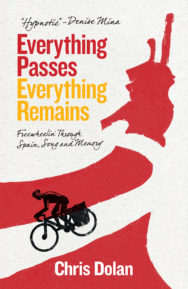‘We more than doubled our individual audiences. No wonder. The sound we made drew people from streets away. I’m playing the Irish Washerwoman and Milton is pulsing out a spliff-saturated slow samba.’
Chris Dolan made his first trip across Spain when he was a teenager, in the footsteps of Laurie Lee. A little bit older and a little bit wiser, he made the same trip, writing of returning, of memories, of art, travel and history. In this extract of his book Everything Passes, Everything Remains, he reminisces about busking the streets and making friends with his fellow musicians.
Extract taken from Everything Passes, Everything Remains
By Chris Dolan
Published by Saraband
When exactly I left Brendan in La Coruña – or he left me to go north to his in-laws in El Ferrol – and I took my violin to begin the vagabond trail in the wake of Laurie Lee, neither of us are sure. I simply remember heading off. First to some of the villages I had already visited with Brian, or Tere, or others. I had never in my life busked before. I was terrified. I also wasn’t very good, which didn’t help. On the other hand, busking wasn’t a thing back then. Now, in Spain as in the UK or anywhere, there are buskers at every corner, the entrance to every tube station. Back then I was a one-off. People stood in astonishment rather than appreciation.
The loneliness of the busker. No one has asked you to play. You’re getting in the way in a public space, a beggar essentially. Aware of your limitations, trying to catch strangers’ attention but not their eye. Hoping for payment but unsure you deserve any. Part of me wanted to be ignored, another craved their approval – and needed their loose change. I had never busked in Scotland, had never met anyone who had. I stood as close to the wall as possible, kept my eye on my fiddle. I felt like a shadow, a smudge on the pavement.
Then passers-by began to throw pesetas into my opened violin case (eventually I learned to put in the first few – silver – ones myself, pour encourager les autres) out of sympathy and concern rather than for having been whisked momentarily to a haven of glorious music. I would usually make just enough to afford the cheapest menú del día in the village, and a night in the most basic pensión.
I didn’t have the adventures, neither the highs nor the lows that Lee had in 1935. Inns in his day sound nineteenth-century in comparison. Bedding down with animals in straw, or in shared barns with entire families. His descriptions of single-room cabins and outhouses, or cheap dormitories in cities, run by drunks and crones and children – it all reads like Dickens. Or Stevenson. David Balfour, lost in the Highlands, taking refuge in black houses and crofts and among the heather. Stevenson wrote Kidnapped in 1886, and set it in 1751, after the turmoil of the Jacobite Rising. So Lee’s accounts sound, in fact, eighteenth-century. Perhaps because he likes to tell a good story and his ‘facts’ are elsewhere dubious, it’s hard not to suspect that he exaggerates his living conditions. But not by much. Spain was poor enough in ‘74, much more so in ‘35. Cut off from Europe by the Pyrenees, exhausted from a century of civil wars (the one in 1936 was far from the first), and another century of thrawn Church and landowners’ conservatism, Lee’s Spain had hardly changed in over a century.
The pensiones I stayed in – and would over the next few years on return journeys – were lugubrious, heavy old furniture, blinds down. There was usually a landlady, usually in her seventies – which back then was shockingly old to me. Almost without exception she’d narrow her eyes, look suspicious, demand payment, or part of it, up front. In every bedroom, hall, and bathroom there were crucifixes, dripping with blood and howling in pain. Stepping inside my room reminded me of going to confession as a child. Closed space, an air of pious anxiety, left alone with sins and penance.
But, just as usually, the old landlady would soon turn out to be kindly, offering you soup a la casera, seldom included in the final bill. If you stayed more than a night she’d even smile, ask you about yourself. You’d open your blinds, let in the light and the noise of the street, meet family and, what appeared initially as some murky house that held terrible secrets, became a family home, into which you were often, temporarily, accepted.
A few times, bar owners who had heard me in the street invited me to play inside, at lunchtime, or in the evening. Reimbursement was a few beers or glasses of wine and a thick, hot caldo gallego – a stew of a few bits of whatever meat was available but mainly cabbage and beans, garlic, onion.
Life was easier now that my Spanish was improving. I could ask for food, beer, accommodation, join in on very basic conversations, explain a little of the background to my songs and tunes. But in Vigo someone from elsewhere in Spain informed me I was talking Gallego. Or rather, the mix of Galician, Spanish and street-talk Brendan I had been unwittingly learning in bars and on Riazor beach. To be absolutely accurate, I was speaking a mix of Gallego, Spanish, street jive, and west coast Scots. (A later version of which a student of mine in Pamplona dubbed escoñol.)
Maybe that’s why I was destined to be The Man Who, unwittingly, Invented Fusion Music. Or at least one half of the duo that invented it. I was in Pontevedra playing my violin on one corner of the main square and some very noisy bongo player was attracting audiences at the other. I can’t remember his name. A young black Brazilian guy. Twice my height, he moved slowly but played fast. After an hour or two he ambled – which implies far too much urgency – up to my pitch. Through his Brazilian-Portuguese-Spanish and my Gallego-Scots we managed to negotiate.
‘Oi, Branquinho. Vamos a play juntos, yeah?’
Hoy, wee white man. Let’s play together.
I’ve since gotten to know the music of Milton Nascimento and now, in my head, that bongo player is called Milton. Milton’s thinking was right. We more than doubled our individual audiences. No wonder. The sound we made drew people from streets away. I’m playing the Irish Washerwoman and Milton is pulsing out a spliff-saturated slow samba. I switch to ‘My Love Is Like A Red Red Rose’, bowing with all the soul and misty romance I could muster, and Milton whacks hell out of his drums in some complex war cry.
Everything Passes, Everything Remains by Chris Dolan is published by Saraband, priced £9.99.
ALSO IN THIS ISSUE

 Tiger by Polly Clark
Tiger by Polly Clark
‘And it taught me that the best research is the kind that takes the writer over, refuses to give its …














